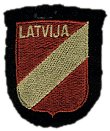Leitmotif — "Blinded Justice"
The factors leading to Hāzners being accused of being a Nazi are the very ones explaining why the government's deportation action failed:
- Nazi propaganda hiding German management and execution of the Holocaust, including "reports" in Berlin of locals pursuing and slaughtering Jews in the streets the way Americans hunted buffalo on the Great Plains; this campaign of disinformation was meticulously planned in advance, prior to Hitler's invasion of the Soviet Union;
- Cold War Soviet propaganda targeting the leadership of the USSR's most troublesome exile national communities. Nazi propaganda was a convenient starting point, indeed, the KGB's most successful anti-Latvian propagandist had worked for the Nazis. However, the primary focus was fabricating archival evidence employed in show trials in occupied Latvia and disseminated to the West as part of Khrushchev's concerted campaign—even creating a KGB division dedicated to that purpose;
- and the predilection to condemn entire peoples as Nazis instead of holding Nazi Germany fully accountable; there was no Holocaust action that the Germans did not supervise and manage.
Those who participated in the Holocaust are a stain on the history of their people but do not define their people. There are those who maintain that the Holocaust decimated Jewry between Germany and Russia because all the peoples caught between those two assaulting powers "fanatically" supported Germany's industrialized slaughter, that there was widespread awareness of the Holocaust and a universal rush by the local populace to join in the slaughter, which, in turn, only confirms centuries-old rabid, virulent anti-Semitism simmering just below the surface waiting to be unleashed. These contentions sell books and fill seminars, but do not serve history.
The Hāzners case proves that any hunt for the guilty where the search for evidence1 commences AFTER accusations are lodged can only tarnish the quest for justice.
We were appalled, in reviewing the INS's post trial brief and citations, to discover that attorneys of the United States Department of Justice (DOJ) misrepresented, even lied, about the the content of Nuremberg trial transcripts and German reports to paint the Baltics as a cesspool of Nazism and to fabricate a Germanless Holocaust, thereby indicting all Latvians as Nazis. It is abundantly clear that the DOJ, girded in righteous anti-Nazi indignation and with the U.S. Congress demanding results2, suffered no impediment to sacrificing the truth in pursuit of their "justice." The DOJ was incapable of comprehending any reality in which Hāzners was innocent.
As Martin Mendelsohn anticipated possible defeat he took solace and satisfaction in having ruined Hāzners life.3 Indeed, U.S. authorities truly left no stone unturned in their persecution of Hāzners. In March, 1978, the INS even contacted West German authorities in Bonn to possibly extradite Hāzners as an accused war criminal to put him on trial in Germany4—despite those very same authorities having informed the INS in 1975 that their investigation of Hāzners was closed for lack of evidence.
Based on its misrepresentations, omissions, and outright lies, one can only conclude that the INS pursued a vendetta, not an objective pursuit of justice, in its campaign against Vilis Hāzners.
| 1 | Minimally, the INS intentionally ignored that German authorities had closed their investigation of Hāzners. We can think of no other reason for the INS not producing Veiss' or Hāzners's military records during the proceedings to substantiate Hāzners's activities. Had this been a true court of law, the government's tactics:
|
| 2 | By the time the INS brought action against Hāzners, the propagandist accusations which Gertrude Schneider brought back from the Soviet Union had been percolating for five years. |
| 3 | viz. Rochelle Saidel's Outraged Conscience: "Mendelsohn seemed determined to prove that Hazners should be deported, but whatever the outcome of the case, he said he believed that the hearing already served a twofold purpose. 'First of all,' he said, 'the media coverage has given residents of the Albany area, and Americans in general, an education about Nazi war criminals. In addition, Hazners is no longer the secure and happy man that he was five years ago. No he's worried about being deported, and this in itself is an accomplishment,' Mendelsohn said." |
| 4 | The INS was attempting to leverage a war crimes treaty which would have compelled West Germany to make the request to place non-Germans on trial for Nazi crimes. Alan A. Ryan, Jr. was still pursuing deportation arrangements in 1982 per reports in the press. |
